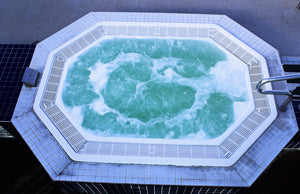How to Stay Warm while Diving
June 17, 2019

 On a day that is cold, raining, and miserable outside, the last thing many people want to do is jump into a swimming pool. For competitive divers though, this is often exactly what must be done. And unlike swimmers, divers are not able to stay in a (heated) pool to keep warm. They must get out of the pool, stand on the diving board in a wet bathing suit, and deal with frigid cold that tightens muscles. The feeling is anything but comfortable.
On a day that is cold, raining, and miserable outside, the last thing many people want to do is jump into a swimming pool. For competitive divers though, this is often exactly what must be done. And unlike swimmers, divers are not able to stay in a (heated) pool to keep warm. They must get out of the pool, stand on the diving board in a wet bathing suit, and deal with frigid cold that tightens muscles. The feeling is anything but comfortable.
Although no one enjoys being cold, it is a factor that divers must learn to tolerate. Feeling cold can certainly debilitate your diving strength. However, there are some methods that are helpful to keep you warm and motivated. Below are five tips that can help you stay toasty while diving.
1. Jump in a Hot Tub or Hot Shower
A word of caution to divers and coaches: Don’t soak too long. Although it is tempting to sit in the hot water and relax, sitting too long will turn your muscles to jelly. It is important to get in, get warm, and then get out!
The best way to stay warm is to use a hot tub or a hot shower in between dives. Many diving pools offer this option to divers. After your body has been immersed in hot water for a while, the effect lingers. It makes the cold air seem not so bad, and you’ll be able to withstand it for a longer period of time. Jumping into a hot tub or hot shower will keep you warm and allow you to perform your dives successfully — even in the coldest weather.
2. Bring Extra Towels
If you don’t have access to warm water of any sort, plan on bringing multiple towels to practice or competition. While waiting in line to dive, keep your body warm by wrapping it in a towel. When it is your turn to dive, hang the towel on a chair or the rails of the diving board, and perform your dive.
It is not as effective as a hot tub, but it will certainly keep you warmer than nothing. To make it so you don’t go through multiple towels, try drying your body off as much as possible with your shammy before you use your towel. That should save you an extra load of laundry when you get home!
3. Use Your Shammy
Divers use shammy’s for all sorts of reasons. It is a handy piece of equipment to carry. Not only does it dry your body off so you can grab your legs effectively, it also keeps you warm. A shammy will not keep you as warm as a towel or a hot tub, but it will certainly help keep the freeze away by drying off the excess water from your body. To get a better idea of why divers should have a shammy, take a look at the iSport guide Why Divers Use a Shammy.
4. Bring a Parka or Warm Jacket
Warm jackets — such as a parka — are excellent ways to stay warm in between dives. A parka is a large jacket that is well-lined for warmth. It covers your body from your head down to your lower legs.
Just as with a towel, make sure you first dry the excess water off your body with your shammy. This will help prevent your parka from getting too wet, too quickly. Another good idea is to use both a towel and a parka. Wrap up in a towel first and then put the parka on over your towel. The towel will absorb most of the water and help keep your parka dry and warm for a longer period of time.
5. Use Cardio to Keep Warm
Lastly, a great way to keep your body warm is to include some sort of cardio activity between your dives. Stay in the pool and tread water, or swim some laps. You can also jump rope on the workout mats, run in place, or do standing jumps — whatever it takes to keep you warm! Diving doesn’t involve a lot of cardio activity. As such, your body won’t likely be warm merely from performing dives.
Diving Comfort
Just about all divers have experienced being cold. It is uncomfortable and can certainly take away from your diving capability. However, as a diver you must know how to deal with cold weather. No one wants to be cold and have their muscles tense up when performing difficult maneuvers. Try the tips listed above and see if you don’t quickly achieve a new comfort level when diving in the cold.



